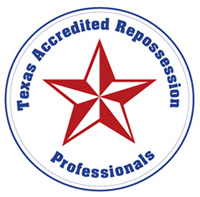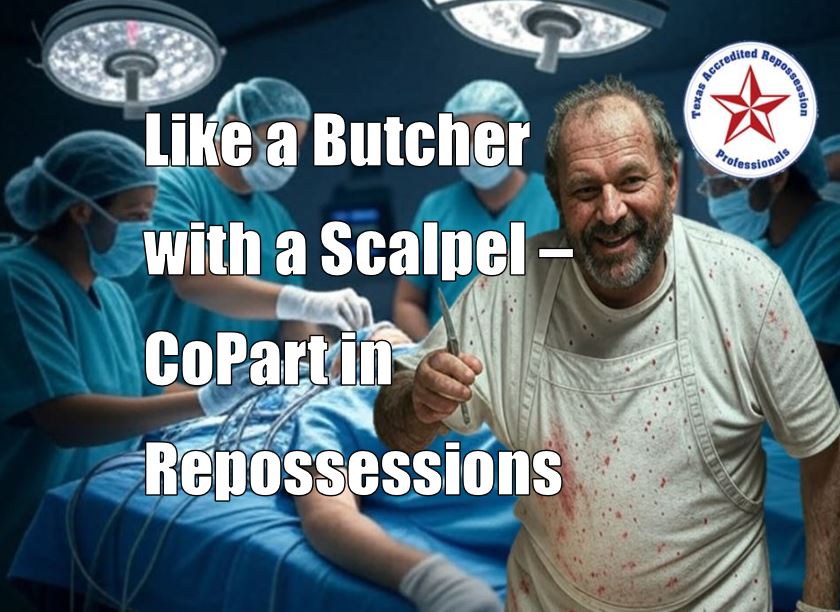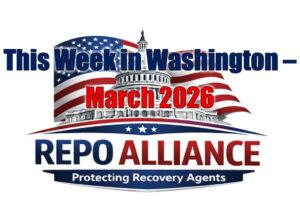CoPart’s Deceptive Entry into Repossession: A Risky and Non-Compliant Gamble
The American Recovery Association (ARA) has sounded a critical alarm regarding CoPart, a publicly traded auction giant, and its unauthorized foray into the auto repossession market. The Texas Accredited Repossession Professionals (TexasARP) stands united with the ARA in their opposition. CoPart’s practice of bypassing established repossession protocols undermines industry standards, evades tax obligations, and exposes lenders, consumers, and the state of Texas to significant legal, financial, and safety risks.
At the heart of this issue lies the legal definition of a repossession, an act that CoPart is ill-equipped to perform compliantly, akin to a butcher attempting surgery. The risks posed by CoPart’s deceptive practices at the state, federal, criminal, and civil levels is troubling for many reasons.
Any effort on the part of themselves or their complicit lenders to obfuscate or legitimize their blatant disregard for legal and professional conduct and procedure is appalling.
Definition of “Repossess” or “Repossession”
Repossess (verb): To recover or take back (property) from a debtor by legal process, typically due to failure to meet payment obligations on a secured loan.
Repossession (noun): The act or process of recovering or taking back property from a debtor by legal authority, often involving collateral such as a vehicle, when the debtor defaults on a loan agreement.
Source: Merriam-Webster Dictionary, “repossess,” accessed May 1, 2025, https://www.merriam-webster.com/dictionary/repossess.
Repossession: A Legal and Regulated Act
Repossession is not a casual retrieval of property but a tightly regulated legal process. As defined by the Texas Business and Commerce Code, a security interest in personal property, such as a vehicle, allows a creditor to take possession of collateral upon debtor default. Any recovery of a vehicle subject to such an interest is legally classified as a repossession, triggering specific compliance, safety, and tax obligations.
This definition is unambiguous: whether a vehicle is impounded, voluntarily surrendered, or involuntarily recovered, if a security interest exists, the act is a repossession.
CoPart, however, maintains that its activities, securing impounded or surrendered vehicles for lenders, constitute mere “tows” or “transports.” This misclassification is not only deceptive but also dangerous, as it sidesteps the rigorous standards governing repossessions. Unlike trained repossession agents, CoPart’s employees and subcontractors lack the specialized training, certifications, and insurance required to navigate the complex and often volatile nature of repossession.
The ARA’s February 2025 statement, following a meeting with CoPart, underscores this concern, noting that CoPart’s practices circumvent nationwide requirements for legal and compliant vehicle recovery.
CoPart’s Untrained Approach: A Recipe for Risk
Repossession is inherently high-risk, involving potential confrontations with debtors, legal scrutiny, and strict adherence to consumer protection laws. Trained professional repossession agents undergo extensive education, including Certified Collateral Recovery certifications, conflict avoidance training, and compliance with state and federal regulations like the Fair Debt Collection Practices Act (FDCPA) and Consumer Financial Protection Bureau (CFPB) guidelines. These professionals are insured to mitigate liabilities and equipped to handle personal property, breaches of peace, and other challenges that arise during recovery.
CoPart, by contrast, lacks this expertise. Its employees and subcontractors, primarily trained for auction logistics, are not versed in repossession-specific protocols.
This deficiency is akin to a butcher attempting surgery: while both may wield tools, only a surgeon is trained to navigate the complexities of the task without causing harm.
The ARA’s recent statement condemns CoPart’s “backdoor practices,” which save lenders money by bypassing legitimate compliant repossession agencies exposing all parties to significant risks.
It is worthy of noting that this practice by lenders of hiring untrained and non-compliant entities to perform repossessions is not limited to CoPart. Instances of transport logistics companies engaging in these practices have also come to light by repossession industry professionals.
Legal and Liability Risks at Multiple Levels
CoPart’s practices create a web of legal and liability issues across state, federal, criminal, and civil domains, threatening lenders, consumers, and the state.
State-Level Risks: In Texas, repossessions are taxable events, with sales taxes levied on all services provided by repossession agents, excluding transport. TexasARP has raised alarms that CoPart’s failure to classify its recoveries as repossessions results in unremitted sales taxes, potentially costing the state substantial revenue.
The Texas Comptroller’s office enforces strict penalties for tax evasion, including liens, asset seizures, and felony charges for significant unpaid taxes, with penalties up to 5% of the unpaid amount and prison sentences of 2–20 years.
By misclassifying repossessions, CoPart and its lender clients risk audits, fines, and legal action from the state, while accredited agents face undue scrutiny for compliance.
Criminal Risks: Repossessions performed without proper training increase the likelihood of breaches of peace, which can escalate into violent confrontations. The repossession industry has seen a rise in violence, with incidents involving firearms and physical harm.
CoPart’s untrained personnel, lack de-escalation skills, heightening the risk of criminal charges such as assault or trespassing if confrontations occur. In extreme cases, fatalities could lead to manslaughter or murder charges, implicating both CoPart and its lender clients.
Civil Risks: Consumers harmed by non-compliant repossessions, through improper handling of personal property, wrongful repossession, or breaches of peace, can pursue civil lawsuits. Lenders face vicarious liability for CoPart’s actions, potentially incurring damages for emotional distress, property loss, or statutory violations.
CoPart’s lack of specialized insurance, unlike that of accredited repossession agencies, leaves lenders vulnerable to uncovered losses. Agency owners have noticed dramatic reductions in impound recoveries, most likely due to these lender practices. Deprived of this income, financial damage has been incurred creating additional lender risk of possible legal recourse for unfair competition or tortious interference.
The Broader Impact: Undermining Industry Standards
CoPart’s actions not only harm individual stakeholders but also erode the integrity of the repossession industry. The TexasARP and the professional repossession industry have long advocated for uniform standards to protect agents, lenders, and consumers. CoPart’s circumvention of these standards creates a double standard, allowing large corporations to exploit loopholes while small, compliant agencies struggle. TexasARP echoes this concern, noting that CoPart’s practices disadvantage accredited agents who invest in training, licensing, and tax compliance.
A Call for Accountability
The ARA and TexasARP’s united stance against CoPart’s deceptive practices is a clarion call for accountability. CoPart’s misclassification of repossessions as tows or transports is not a mere technicality; it is a deliberate evasion of legal, financial, and ethical obligations.
Lenders who partner with CoPart to cut costs are complicit in this scheme, exposing themselves to audits, lawsuits, and reputational damage. The state of Texas, losing critical tax revenue, must investigate and enforce compliance. Consumers, at risk of harm from untrained operatives, deserve protection.
To address this crisis, the following steps are essential:
- State Investigation: The Texas Comptroller’s office should audit CoPart’s vehicle recovery activities to ensure proper tax remittance and compliance with repossession laws.
- Federal Oversight: The CFPB should expand its scrutiny to include CoPart’s practices, ensuring adherence to consumer protection laws.
- Industry Standards: Lenders must prioritize partnerships with accredited, trained repossession agencies to mitigate risks and support industry integrity.
CoPart’s entry into the repossession market is a reckless gamble, driven by profit at the expense of compliance, safety, and fairness. Like a butcher wielding a scalpel, CoPart is dangerously out of its depth. The ARA and TexasARP’s advocacy serves as a vital reminder: repossession is a specialized profession, not a shortcut for corporate gain. It is time for regulators, lenders, and the industry to hold CoPart accountable and restore the standards that protect all stakeholders.
Sincerely,
The Texas Accredited Repossession Professionals
Related Articles:
ARA’s Stand Against Backdoor Practices
AIR Condemns Unethical and Illegal Repossession Practices by Lenders
TexasARP: The Continued Sales Tax Burden on Repossessions After Comptroller’s Decision
Everyone is Welcome at the TexasARP Annual Meeting 2025
Navigating the Texas Repo Tax Tightrope
 Texas Accredited Repossession Professionals (TexasARP)
Texas Accredited Repossession Professionals (TexasARP)
TexasARP is an organization comprised of collateral recovery agency owners/employees in Texas and nationwide. Our goal is to educate our members, financial institutions and law enforcement with regard to business requirements and ordinances set forth by the cities and counties in the state of Texas. The purpose of the association is to strengthen understanding between recovery agency owners, law enforcement, financial institutions, regulatory agencies and the consumer. TexasARP will provide continuing education to our members, financial institutions and law enforcement officials. Education platforms will focus in the fields of professionalism, business principles, public relations and innovations in the industry.
Texas Accredited Repossession Professionals (TexasARP) | 9203 Hwy 6 South #124 | Houston , TX, USA 77083












More Stories
Colorado Bill Aims to Severely Impact All Repossession Operations
Today is Fallen Agents Day – 2026
From Auction Cutting to Field Programming: The Structural Shift No One Budgeted For
Register NOW—TexasARP in Person Meeting
Bad Apples in the Repossession Industry
Why Self-Help Repossession Is Taken for Granted — and Why Losing It Would Hurt Consumers Most